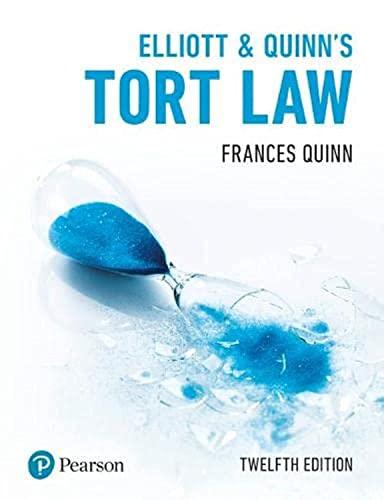Question
You are a corporate law specialist working for Flinders Partners, a mid-tier professional services firm in Melbourne. One of your clients is Gold & Associates
You are a corporate law specialist working for Flinders Partners, a mid-tier professional services firm in Melbourne. One of your clients is Gold & Associates Ltd (G&A). It is a communications company specialising in public relations, campaigning, and reputation management services - and is well established as the leader in the field.
The directors of G&A are Eli (Managing Director), Clarke (Chief Financial Officer & Company Secretary) and Marylin (non-executive director). Marylin is also a director and shareholder of Sweeny Constructions Pty Ltd. Although the other directors know that Marylin has several other directorships in addition to G&A, they are not sure of the specifics. There are 30,000 shares in G&A, with no single shareholder commanding a majority. The company has over 50 employees based in its Melbourne office.
A few events occur throughout 2017:
In June, Eli wants to refurbish the company's offices. The Board agrees that Marylin will undertake the planning and contact relevant suppliers to tender for work. In July, Marylin provides a report that proposes Sweeny Constructions as the best firm for the job, at a cost of around $1 million. No public tender took place. Although this price is high - Eli doubts that he'll be able to find a cheaper option and still achieve the 'high end' look that he wants. The Board relies on Marilyn's advice and agrees to enter into the contract.
In July 2017, Eli begins working for Peter who is a candidate for the upcoming State election. The agreed retainer is $20,000 per month for the length of the year-long campaign. Although Peter is an existing client of G&A, Eli incorporates a separate company - Eli Pty Ltd - to bill Peter each month for the services provided. All the work that Eli conducts for the campaign is based from G&A's offices, and he uses G&A's telephone, printer, and company vehicle for the campaign.
In August 2017, Clarke is beginning to worry about the company's finances. G&A has strict credit terms in place with its clients. After invoices are issued each month, clients are contractually required to make full payment within 28 days. Eli often makes exceptions for his favoured clients - often allowing them to take more than 90 days to pay their account. Eli is worried that unless he does this the clients will go elsewhere. Clarke disagrees with the policy change, but Eli refuses to look at the company's financial accounts and tells him to stop worrying. In fact, the directors have not had a proper directors meeting in months and have just relied on occasional verbal reports. The accounts show that bad debts are increasing and are causing serious cash-flow problems.
Meanwhile, a group of the shareholders are unhappy about the financial performance of the company. They are also unhappy that Eli's candidate is not doing very well in the polls and are worried that it could hurt the company's reputation. It is now September. G&A's Annual General Meeting is scheduled for later this month, and the group of shareholders write to Clarke and propose three resolutions:
1.Overturn the directors' decision to refurbish the offices, saving the company $1 million;
2.Change the constitution to require that decisions over $1 million be approved by the shareholders in a general meeting;
3.Remove Eli from the Board of Directors.
There are rumours that ASIC are investigating the actions of the directors. The directors of G&A approach you to advise the company. Clarke also asks your advice about whether he should list any of these items on the agenda, he has not yet informed the other directors and wants to know if the resolutions would be enforceable if they passed.
REQUIRED QUESTIONS:
1.Advise whether any action can be taken against any or all the directors for a breach of their statutory duties as directors of the company.
(Note: consider only statutory duties, but you should refer to case law as relevant)
2.If ASIC are successful in bringing an action, advise the directors about the potential penalties or remedies that a court could impose against them?
3.Advise as to whether any of the resolutions proposed at the upcoming general meeting are legally valid and enforceable.
Step by Step Solution
There are 3 Steps involved in it
Step: 1

Get Instant Access to Expert-Tailored Solutions
See step-by-step solutions with expert insights and AI powered tools for academic success
Step: 2

Step: 3

Ace Your Homework with AI
Get the answers you need in no time with our AI-driven, step-by-step assistance
Get Started


